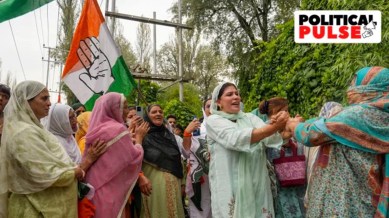Congress finishes with 1 in Jammu, wiped out by BJP in the plains
Ally NC wins seven seats in the province, Congress done in by lacklustre campaign, poor candidate selection, old resentments.

Barring Nowshera, Chhamb and Bani seats, which went to Independents, the BJP swept the entire predominantly Hindu-inhabited areas across the Jammu province in the Assembly elections.
The BJP, which had won 25 seats in these districts of Udhampur, Jammu, Samba, Kathua and Reasi in the 2014 Assembly polls, won 29 this time. (The total seats in the Jammu province are 43 now, following delimitation, instead of 37 when the elections were last held in J&K in 2014.)
The Congress had won five seats in Jammu province in the 2014 elections.
The Congress was seen as having an edge in Jammu at the start of the poll campaign due to strong anti-incumbency against the BJP over different issues, including a rise in eviction drives and property taxes, setting up of toll plazas, as well as disappointment over the non-materialization of promised opportunities following the abrogation of Article 370. There was also resentment within the party ranks over dropping of many senior leaders to pave way for new faces.
However, the Congress stumbled in converting all these factors into votes, mainly due to its lacklustre campaign against the BJP’s aggressive fightback across the region. Senior Congress leaders especially Rahul Gandhi did not address a single rally in Jammu, Samba, Kathua and Udhampur districts, which the BJP swept. Even ally and National Conference vice-president Omar Abdullah commented on the Congress’s failure to pull its weight in Jammu.
The Congress list also got its caste calculations wrong. In a province where Brahmins and Mahajans are in sizeable numbers, the party fielded only two Brahmins, and no Mahajan leader. Later, in a damage control exercise, the party announced a Brahmin and Mahajan as working presidents, but it was too late by then.
There was also resentment against the Congress over issues of Dogra certificate and settlement of Rohingya. In 2011, when the Congress was in power at the Centre, the benefits available only to the Dogras during Army recruitment were extended to people across the whole of J&K. The Congress government is also accused by many of allowing settlement of the Rohingya refugees.
The Congress leaders who lost in Jammu included two of its working presidents, a former state president and several ministers. Among those who lost was Tara Chand, the Congress’s Dalit face and former deputy chief minister, who came third in Chhamb. Congress rebel Satish Sharma won as an Independent from here, defeating the BJP’s Rajeev Sharma, a former MLA, by 6,929 votes.
Other prominent Congress leaders who lost or were trailing were working president and former minister Raman Bhalla (R S Pura), ex-PCC chief and former minister Vikar Rasool Wani (Banihal), two-time former MP Choudhary Lal Singh (Basohli), former ministers Manohar Lal Sharma (Billawar), Yogesh Sawhney (Jammu East), Mula Ram (Marh) and Mohd Shabir Khan (Thanamandi).
The NC contested 17 seats in Jammu, including five where it was engaged in a friendly contest with the Congress. Of these, it won seven, including the four ST-reserved seats in Rajouri, Poonch and Reasi district. It also won Banihal, where it was in a friendly fight with former Congress J&K president Viqar Rasool Wani.
In one seat, Doda, the Aam Aadmi Party was the surprise winner, with its candidate Mehraj Malik defeating his BJP rival by over 4,538 votes. Malik is a popular local leader and a District Development Council (DDC) member. The AAP had fielded seven candidates across the Union Territory.
The Independent winners in Jammu included Payare Lal Sharma, who won in Inderwal, defeating veteran leader Gulam Mohammad Saroori, former leader of the Democratic Progressive Azad Party, by a narrow margin of 643 votes.
In Bani, Rameshwar Singh defeated BJP candidate and former MLA Jewan Lal by 2,048 votes, while in Surankote, NC rebel Choudhary Mohammad Akram, contesting as an Independent, defeated Congress candidate Mohammad Shahnawaz by 8,851 votes.
Of the 14 seats in Jammu that the BJP lost, its biggest upset was in Nowshera, where its J&K president and former MLA Ravinder Sharma lost to the National Conference’s (NC’s) Surinder Choudhary by 7,819 votes.
In Ramban, the BJP’s Rakesh Singh Thakur finished third, with the NC’s Arjun Singh Raju winning. A BJP rebel contesting as an Independent, Suraj Singh Parihar, came second here.
The BJP winners included Shagun Parihar, 29, its lone woman candidate in Jammu. Parihar, whose father and uncle were killed in a terror attack, won from Kishtwar, defeating NC leader and former minister Sajad Ahmed Kitchloo by 521 votes. Parihar attributed her win to “the nationalist people of Jammu and Kashmir”.